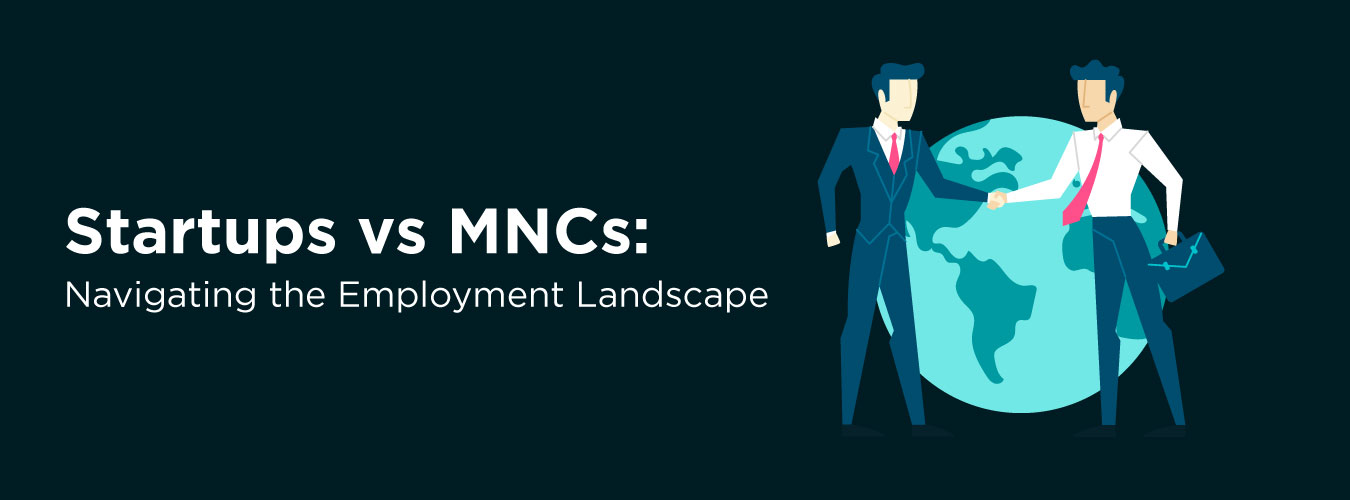Startups vs MNCs
Career choices for both newbies and established professionals can be confusing. There is always a toss-up between working for an MNC vs working for a startup. It is a classic battle as to which is the better workplace and which has the potential to take one’s career to new heights. Both types of organizations offer unique work experiences and are very different in terms of work culture, environment, growth potential and opportunities. Your experience and expectations largely determine which type of organisation that you will choose. Let us examine various criteria to understand startups and MNCs better.
Table of Contents
Differences between an MNC and a Startup
1. Company size and structure
Obviously, a multinational company is big in size because of presence across countries and a huge employee strength. The startup on the other hand is small in terms of size and employee strength. MNC have well-defined hierarchical structures as against Startups which are small, agile and have a flat organizational structure.
2. Work Culture
MNCs have a formal work structure which can be rigid at times with well-defined roles and responsibilities.They have great, established brand value as a workplace whereas startups offer in-depth and real-time exposure. The work culture with startups is informal and career growth is unpredictable. Startups however have a more flexible and dynamic work environment with lots of collaboration and cross-functional roles. This allows employees to wear multiple hats and work on areas outside their area of expertise thereby allowing employees to develop a broad skill set. Startups also have open communication and the founders and executives being more accessible.
3. Job security and stability
Job security and stability are a concern for every candidate seeking employment. MNCs have established business models and steady revenue streams and they have built a strong customer base and are less vulnerable to market fluctuations. They therefore offer a very stable and secure environment to work in. In contrast, startups are considered less stable and riskier.They are more vulnerable to market fluctuations and various issues like funding drying up and cannot offer stability.
4. Career growth and learning
Both startups and MNCs offer great opportunities for learning. MNCs have structured learning programs and allow employees to develop their skills and grow in the organization. Learning happens when large initiatives are undertaken by MNCs, which can be very valuable. Startups on the other hand allow you to work on areas that you have no expertise in, so the ability to learn new skills is very high in startups. They have a fast-paced and dynamic work environment so you will learn adaptability and a sense of urgency. Learning is very broad-based in a startup and everyone is learning together irrespective of the hierarchy.
5. Compensation and benefits
The biggest benefit of working in an MNC is the compensation and benefits program that they offer. Things like healthcare, retirement plans, paid time off,sharing of bonuses and ESOPs are very valuable for employees of MNCs. Startups on the hand offer the benefit of stock options which can bring in huge benefits when the company goes public. So, while you must put in effort and can rise the ranks in a startup, in an MNC, you will be overwhelmed with perks and incentives.
6. Innovation and creativity
Startups lead with innovation and provide an exciting, creative, and dynamic environment to work in. Since they normally work in areas that are focused on developing new products, the work lends itself to a high level of innovation and creativity. The MNCs, in contrast, are focused on maintaining the status quo and optimizing existing products and services. Startups are a great place to work for people who are exploring new ideas.
7.Work-life balance
MNCs have a structured work environment, which leads to predictable work hours whereas startups have a dynamic and fast-paced work environment,which leads to long work hours that can be stressful.
Working in a Startup
Pros
- Growth opportunities
- Great autonomy and recognition for work done
- Creative freedom
Cons
- Financial instability
- No work-life balance with long working hours
- Lack of infrastructure
Working in an established MNC
Pros
- Stability and well-defined career path
- Established processes
- Solid reputation
Cons
- Slow career progression
- Limited autonomy
- Less creative freedom
If you are looking for job security, then an MNC is your best bet whereas if you are looking for a gateway to start your own enterprise, then you must be employed in a startup which will give valuable lessons.
Conclusion
Startups and MNCs offer completely different work environments, so it is a tough choice to choose one as a career option. However, this choice should be made based on one’s personal priorities and personality. MNCs are lucrative and offer more perks, while startups may be a valuable option for those looking for a learning environment, which is also fast-paced.
People Also Ask:
1. Is it better to join an MNC or a startup?
Both have their pros and cons. It depends on your personal priorities and personality. You must make a choice based on what is important for you.
2. What is the difference between startups and big companies?
Large companies have a structured work environment and offer a steady career path whereas startups have a dynamic work environment which allows for creativity, innovation, and experimentation. Startups do not have a steady revenue stream while MNCs have very stable revenue streams.
3. Do startups pay more than big companies?
Startups offer stock options to employees, which may result in a significantly large amount when the company goes public or when the company is bought over. Hence, despite the risks, the employee of a startup may earn significantly higher than a person working in an MNC.










